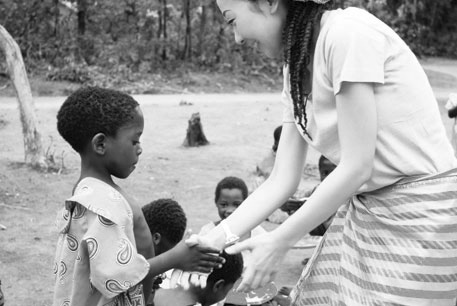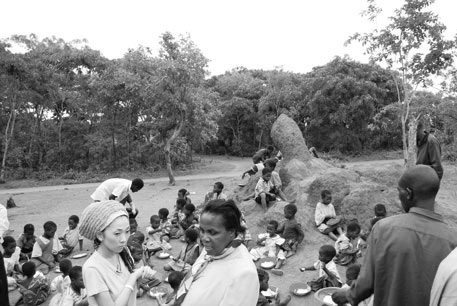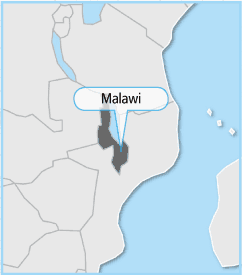Japan's Official Development Assistance White Paper 2010
Column 5 Joining Hands to Promote Development
— Interview with COP10 Honorary Ambassador MISIA —
You campaign for the education of children in developing countries, including Africa. Can you share what left a deep impression on you when you visited the communities in these countries?
What stands out mostly in my memory is the time when I visited a primary school in Kibera, a slum in Kenya's capital city, Nairobi. Stories of a mother who gave her child poison thinking it was medicine, due to a lack of literacy, and children going into dangerous areas because they cannot read the word "dangerous." The ability to read and write, I believe, enables people not only to live safely, but also allows them to connect to the world. I also learned that schools are the place where children and their parents exchange information and heal their mind through conversations. The schools even serve as shelter for children and are a place where they can eat school lunches. These experiences drove me to support the education of African children. I always ask myself, "What is poverty?" and with this question in my mind, I visited Malawi, Mali, and in 2010, South Africa for outreach activities.
The UN Secretary-General appointed you the COP10 Honorary Ambassador. What do you think is necessary for the conservation of biodiversity?
Biodiversity means that all life is connected to and supports each other. Needless to say this means our food, clothing, and shelter, but it also means other items, such as medicine and the diverse culture created by rich ecosystems. I think it is necessary that people around the world, across borders and races have "knowledge" and "consciousness" about biodiversity. When I visited satoyama (villages, surrounding mountain forests and rice paddies), a person who guided me said, "In nature, there are no insects called pests and no grass called weed. All living forms have their role, and there are a lot of things in nature which we human beings just do not know yet." It made me realize that we need once again to be aware of what it is like to be in awe and respect nature. I expect that the outcomes of discussions in COP10 will help protect our lives and livelihood. Furthermore, since biodiversity is a wide-ranging issue, I believe it is essential that people from lots of sectors, including researchers, NGOs, businesses, and international organizations, cooperate and work with each other to conserve biodiversity.
What do you expect for development cooperation, including Japanese ODA?
I believe, in development cooperation, it is important to be conscious about our coexistence and how we are going to live together. It is also crucial that "support" reaches those who actually need it. I have heard stories in Africa, that development caused lake pollution, and people cannot continue their way of life, because they can't fish anymore. I learned that unregulated development generates further poverty. I am involved in an outreach activity to send mosquito nets to Malawi called "Love is Free" Campaign. In February 2010, we distributed our first set of mosquito nets. Afterwards, our local coordinator assessed the utilization of the mosquito nets. This is to ensure that when we do our next distribution, it will be more closely matched to their requirements. I hope that instead of donor-driven one-sided assistance, donors and beneficiaries will join hands and promote development cooperation together.

Malawi, 2008 (right, MISIA)(Photo: Child AFRICA)

MISIA (left) with the representative of a local NGO which raises awareness about malaria prevention in Malawi (Photo: Child AFRICA)

